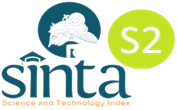Pengaruh Penggunaan Model Project Based Learning Terhadap Keterampilan Kolaborasi Mahasiswa Pendidikan IPA
DOI:
https://doi.org/10.33477/bs.v8i1.844Abstract
This report aims to review the influence of the use of learning model learning project based on skill collaboration education students science education UNM. The research is praeksperimen research. A design study used is one- shot case study. Subjects research is a student science education that doing lecture motion and change. Research instruments used to measure skill collaboration students is the instrument non the tests which consisted of rubric and the survey. Analysis of data done through descriptive statistics and statistics inferential. Analysis deskriktif statistics show that increased skill collaboration students when dibelajarkan use the model project is based learning about 18 of 29 students able to reach the score over the level of 1. While to test inferential shows that is the kind of classroom learning project based on skill collaboration Key Words: PjBL, Skill Colobaration, Science EducationReferences
Badan Standar Nasional Pendidikan. (2010). Laporan BSNP Tahun 2010. Jakarta: Badan Standar Nasional Pendidikan.
Bell, S. (2010). Project Based Learning for The 21st Century: Skills for The Future. The Clearing House. Routledge Tailor & Francis Group. 83: 39-43.
Bellanca, J. 2012. Proyek Pembelajaran yang Diperkaya: Jalur Praktis Menuju Keterampilan Abad ke-21. Jakarta: Indeks.
Bellanca, J., & Terry, S. (2011). Classroom Without Borders: Using Internet Project to Teach Communication and Collaboration. New York: Teachers College, Collumbia University.
Bender, W. N. (2012). Project Based Learning: Differentiating Instruction for The 21st Century. United State of America: Corwin
Cameron, S., & Carolyn C. (2014). Project-Based Learning Task for Common Core State Standards, Grade 6-8. United State of America: Mark Twain Media, Inc.
Departemen Pendidikan Nasional (Depdiknas). (2003). Standar Kompetensi Bahan Kajian: Pelayanan Profesioanal Kurikulum Berbasis Kompetensi. Jakarta: Puskur Balitbang.
Greenstein, L. (2012). Assessing 21st Century Skill: A Guide to Evaluating Mastery and Authentic Learning. United States of America: Corwin A Sage Company.
Greenhill, Valerie. (2010). 21st Century Knowledge and Skills in Educator Preparation. American Association of Colleges for Teacher Education; Partnership for 21st Century Skills
Huang, D., Seth, L., Cheri, H., Debora, L.T., Nora, O., & Gwendelyn, R. (2010). Preparing Students for The 21st Century: Exploring The Effect of Afterschool Participation on Students’ Collaboration Skills, Oral Communication Skills, and Self-Efficacy. Cress Report (CR) of The National Center for Research on Evaluation, Standards, and Student Testing. University of California: Los Angeles, CR 777.
Lee, Huh, Reigeluth. (2015). Collaboration, intragroup conflict, and social skills in project-based learning. Instructional science. Volume 43, Issue 5, pp 561–590. Springer.
Musa, F., Norlaila, M., Rozmel A.B., & Maryam M. A. (2011). Project Based Learning (PjBL): Inculcating Soft Skills in 21st Century Workplace. Procedia- Social and Behavioral Sciences, Elsevier, 59 (2012) 565 – 573.
National Research Council of The National Academies. (2013). Education for Life and Work: Developing Transferable Knowledge and Skills for 21st Century. Washington, DC: The National Academies Press.
National Science Teachers Association (NSTA). (2011). The NSTA Reader’s Guide to A Framework for K-12 Science Education. Virginia: NSTA Press.
Notari, M., Baumgartnert, A., Herzogt, W. (2013). Social Skills as Predictors of Communication, Performance and Quality of Collaboration in Project Based Learning. Journal of Computer Assisted Learning, 30. 132 - 147
Partnership for 21st Century Skills. (2002) Learning for The 21st Century: A Report and Mile Guide to 21st Century Skills. United State of America: U.S. Department of Education.
Partnership for 21st Century Skills. (2015) P21 Framework Defenitions. United State of America: U.S. Department of Education.
Pearlman, B. (2006). Project Based Learning Teaches Kids the Collaborative and Critical Thinking Abilities They Will Need to Compete. A New Skills for A New Century, 51 – 53. June, 2006.
Patton, A., & Jeff, R. (2012). Work that Matters: The Teacher’s Guide to Project Based Learning. United Kingdom: Paul Hamlyn Foundation.
Priansa, D.J. (2015). Manajemen Peserta Didik dan Model Pembelejaran. Bandung: Alfabeta.
Rais. (2010). Project Based Learning: Inovasi Pembelajaran yang Berorientasi Soft Skill. Makalah disajikan dalam Seminar Nasional Pendidikan Teknologi dan Kejuruan Fakultas Teknik Universitas Negeri Surabaya, Surabaya. 11 Desember.
Riduwan. (2014). Dasar – dasar Statistika. Bandung: Alfabeta.
Roekel, D.V. (2011). Preparing 21st Century Students for a Global Society: An Educator’s Guide to The “Four Cs”. Washington, DC: NEA (National Education Association).
Sukmadinata, N.S. (2011). Metode Penelitian Pendidikan. Rosdakarya. Jakarta.
Shadaika, M. (2013). Pengaruh Model Project Based Learning Berbasis Potensi Makroalga Daerah Pesisir Terhadap Kemampuan Berpikir Kritis Siswa pad Materi Ekosistem di SMA Negeri 1 Tanjungsari Gunungkidul DIY. Makalah disajikan dalam Seminar Nasional Konservasi dan Pemanfaatan Sumber Daya Alam, Surakarta. 13 Januari 2015.
Tim Pengajar Deakin. (2013). The Series of Teaching Resources. Melbourne: DLF
Downloads
Published
Issue
Section
License
Authors who publish with this journal agree to the following terms: Authors retain copyright and grant the journal right of first publication with the work simultaneously licensed under a Creative Commons Attribution License that allows others to share the work with an acknowledgement of the work's authorship and initial publication in this journal. Authors are able to enter into separate, additional contractual arrangements for the non-exclusive distribution of the journal's published version of the work (e.g., post it to an institutional repository or publish it in a book), with an acknowledgement of its initial publication in this journal. Authors are permitted and encouraged to post their work online (e.g., in institutional repositories or on their website) prior to and during the submission process, as it can lead to productive exchanges, as well as earlier and greater citation of published work.














